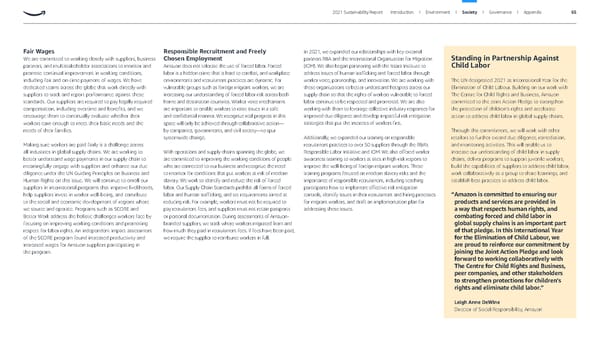Responsible Recruitment and Freely Chosen Employment Amazon does not tolerate the use of forced labor. Forced labor is a hidden crime that is hard to combat, and workplace environments and recruitment practices are dynamic. For vulnerable groups such as foreign migrant workers, we are increasing our understanding of forced labor risk across both home and destination countries. Worker voice mechanisms are important to enable workers to raise issues in a safe and confidential manner. We recognize real progress in this space will only be achieved through collaborative action— by companies, governments, and civil society—to spur systemwide change. With operations and supply chains spanning the globe, we are committed to improving the working conditions of people who are connected to our business and recognize the need to monitor for conditions that put workers at risk of modern slavery. We work to identify and reduce the risk of forced labor. Our Supply Chain Standards prohibit all forms of forced labor and human trafficking, and set requirements aimed at reducing risk. For example, workers must not be required to pay recruitment fees, and suppliers must not retain passports or personal documentation. During assessments of Amazon- branded suppliers, we track where workers migrated from and how much they paid in recruitment fees. If fees have been paid, we require the supplier to reimburse workers in full. In 2021, we expanded our relationships with key external partners RBA and the International Organization for Migration (IOM). We also began partnering with the Issara Institute to address issues of human trafficking and forced labor through worker voice, partnership, and innovation. We are working with these organizations to better understand hotspots across our supply chain so that the rights of workers vulnerable to forced labor continue to be respected and promoted. We are also working with them to leverage collective industry responses for improved due diligence and develop impactful risk mitigation strategies that put the interests of workers first. Additionally, we expanded our training on responsible recruitment practices to over 50 suppliers through the RBA’s Responsible Labor Initiative and IOM. We also offered worker awareness training to workers at sites in high-risk regions to improve the well-being of foreign migrant workers. These training programs focused on modern slavery risks and the importance of responsible recruitment, including teaching participants how to implement effective risk mitigation controls, identify issues in their recruitment and hiring processes for migrant workers, and draft an implementation plan for addressing these issues. Standing in Partnership Against Child Labor The UN designated 2021 as International Year for the Elimination of Child Labour. Building on our work with The Centre for Child Rights and Business, Amazon committed to the Joint Action Pledge to strengthen the protection of children’s rights and accelerate action to address child labor in global supply chains. Through this commitment, we will work with other retailers to further extend due diligence, remediation, and monitoring activities. This will enable us to increase our understanding of child labor in supply chains, deliver programs to support juvenile workers, build the capabilities of suppliers to address child labor, work collaboratively as a group to share learnings, and establish best practices to address child labor. “ Amazon is committed to ensuring our products and services are provided in a way that respects human rights, and combating forced and child labor in global supply chains is an important part of that pledge. In this International Year for the Elimination of Child Labour, we are proud to reinforce our commitment by joining the Joint Action Pledge and look forward to working collaboratively with The Centre for Child Rights and Business, peer companies, and other stakeholders to strengthen protections for children’s rights and eliminate child labor.” Leigh Anne DeWine Director of Social Responsibility, Amazon Fair Wages We are committed to working closely with suppliers, business partners, and multistakeholder associations to monitor and promote continual improvement in working conditions, including fair and on-time payment of wages. We have dedicated teams across the globe that work directly with suppliers to track and report performance against these standards. Our suppliers are required to pay legally required compensation, including overtime and benefits, and we encourage them to continually evaluate whether their workers earn enough to meet their basic needs and the needs of their families. Making sure workers are paid fairly is a challenge across all industries in global supply chains. We are working to better understand wage payments in our supply chain to meaningfully engage with suppliers and enhance our due diligence under the UN Guiding Principles on Business and Human Rights on this issue. We will continue to enroll our suppliers in international programs that improve livelihoods, help suppliers invest in worker well-being, and contribute to the social and economic development of regions where we source and operate. Programs such as SCORE and Better Work address the holistic challenges workers face by focusing on improving working conditions and promoting respect for labor rights. An independent impact assessment of the SCORE program found increased productivity and increased wages for Amazon suppliers participating in the program. 2021 Sustainability Report Introduction I Environment I Society I Governance I Appendix 65
 ESG Report | Amazon Page 64 Page 66
ESG Report | Amazon Page 64 Page 66